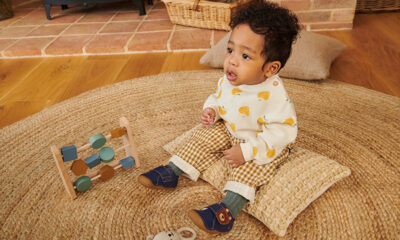Advice
Toddler Mealtimes Expert Tips


Expert / 12 May, 2025 / Ellie Thompson
This week, 12th-19th May is National Weaning Week, and we know that navigating toddler mealtimes can feel like a daily test of patience and creativity, especially when your once-adventurous eater suddenly decides peas are the enemy and toast is life. That’s why we’ve called in expert help.
Lucy Upton is a Specialist Paediatric Dietitian (and a toddler mum herself), and she knows exactly what you’re going through. In the article below, Lucy shares her top evidence-based tips to help take the pressure off, support your child’s relationship with food, and bring a little calm back to the table.
The transition from mealtimes with babies, who often “eat everything” and happily explore a wide range of foods, to toddlers who suddenly refuse their favourite meals or seem to be surviving on beige snacks and fresh air, can catch many parents by surprise, and quickly turn mealtimes into a source of daily stress. As a specialist paediatric dietitian (and parent to a toddler!), I know how normal these tricky phases are and how overwhelming it can feel when you’re in the thick of it. The good news? Plenty of simple, evidence-based strategies can help bring calm back to the table, give them opportunities to try new foods and support your little one’s long-term relationship with food.
Here are my top tips for toddler mealtimes, designed to support your toddler’s development.
Beware the grazing
It’s exceptionally common for parents to tell me that their toddlers love snacks, and there are many reasons for this. From favourite characters on packaging to the predictability of taste and texture of the foods inside, there is much for toddlers to enjoy. However, regular snacking and grazing can significantly disrupt a toddler’s appetite for main meals. Parents often wonder why toddlers don’t seem hungry at mealtimes. Whilst this can be normal, if a toddler has grazed on 3-4 separate snacks across the morning, they’ve likely hit their energy quota for the time being, and so often can then seem disinterested in meals that follow.
Whilst your toddler may also be bidding for control by asking for snacks, I encourage parents to anchor toddlers’ meals and snacks throughout the day, allowing them an opportunity to eat every 2-3 hours (e.g., three meals and two snacks per day), thereby avoiding a conveyor belt of snack options.
Understand toddler appetite
One of the biggest battles I see parents face is trying to ‘get’ their toddler to eat something at every mealtime. This is why they are often surprised when I explain that it’s very normal for toddlers to have meals or even weeks where they eat smaller amounts than usual or refuse some meals entirely. Even though your toddler is still growing rapidly, they actually need less energy per kilogram of their body weight to grow compared to when they were a baby. They also undergo periods of rapid growth, followed by periods of slowed growth.
I share this with parents weekly in clinic, as it helps set the scene for why their toddlers’ eating habits fluctuate so much! While some weeks they may eat you out of house and home, in other weeks it can be common for toddlers to eat much less. This lack of predictability around eating can be a hard wave to ride as a parent, but it is entirely normal. Leaning into trusting your toddler’s natural ability to listen to their appetite can help reduce the pressure you may feel at mealtimes to over-encourage or persuade them to have “just one bite.” Ultimately, falling into these behaviors can create mealtime tension and food refusal, especially with increasingly independent and defiant toddlers.
Given them some control (yes, really)
I always advocate for working with toddlers’ development at mealtimes to support their eating and food exploration, and to keep mealtime battles to a minimum. One of the most common developmental changes you’ll have noticed in your toddler is their increased independence and desire to control their world; yet, toddlers often don’t have much choice when it comes to mealtimes. They typically don’t decide when mealtimes are, what’s on offer or how much is on their plate – so some may seek the control they want by asking for something else, declaring they don’t like the meal or moving foods off their plate. If this sounds familiar, here are some ways you can offer your toddler some control at mealtimes, which often helps to reduce mealtime stress and increase engagement with foods on offer;
- Give them simple choices, e.g., between two things at mealtimes: “We are having pasta for dinner—would you like cheese or tomato sauce?”
- Offer dips or sprinkles alongside the meal that they can interact with or add at the table, e.g. grated cheese, grated vegetables, seeds, yoghurt dips, guacamole.
- Let them self-serve. Offer picky dinner or meal options in the middle of the table, and let them choose what comes to their plate.
- Get them involved in helping to prepare something for dinner or set the table.
Show them, don’t tell them what to do.
Parents often ask me why their toddler eats everything at nursery but refuses, even the same foods, at home. One of the main positive influences at a nursery or childcare is the presence of many mini role models at mealtimes, namely their peers. When considering toddlers’ development, they learn by watching, parroting, and mirroring what others do, which is no different at mealtimes. While busy households and working parents can make mealtimes together more challenging, I encourage parents to sit and eat with their toddlers whenever possible. Enjoying a meal together can mean you show them what to do, instead of telling them, e.g. “eat your”. Above all else, mealtimes together also offer something your toddler is always after – connection with you! Remember, mealtimes offer much more than just the food on the table. Just make sure to let go of any idea of ‘perfection’ when it comes to mealtimes together – messy, chaotic, and short is perfectly normal when eating with toddlers!
For many more tips on feeding toddlers, child nutrition, feeding behaviors and more, check out Lucy’s debut book, The Ultimate Guide to Children’s Nutrition by Lucy Upton, out 8th May, RRP £18.99 (Yellow Kite)
READ NEXT
The Cutest Way To Serve Breakfast In Bed: Introducing ergoPouch’s Breakfast Club Collection
Decoding Baby Mealtime Cues: What Your Little One Is Really Trying To Tell You
-

 Destination8 months ago
Destination8 months agoSingapore Airlines CEO set to join board of Air India, BA News, BA
-

 Breaking News9 months ago
Breaking News9 months agoCroatia to reintroduce compulsory military draft as regional tensions soar
-

 Tech News11 months ago
Tech News11 months agoBangladeshi police agents accused of selling citizens’ personal information on Telegram
-

 Productivity11 months ago
Productivity11 months agoHow Your Contact Center Can Become A Customer Engagement Center
-

 Breaking News9 months ago
Breaking News9 months agoBangladesh crisis: Refaat Ahmed sworn in as Bangladesh’s new chief justice
-

 Toys11 months ago
Toys11 months ago15 of the Best Trike & Tricycles Mums Recommend
-

 Gadgets3 months ago
Gadgets3 months agoSupernatural Season 16 Revival News, Cast, Plot and Release Date
-

 Guides & Tips9 months ago
Guides & Tips9 months agoHave Unlimited Korean Food at MANY Unlimited Topokki!
























